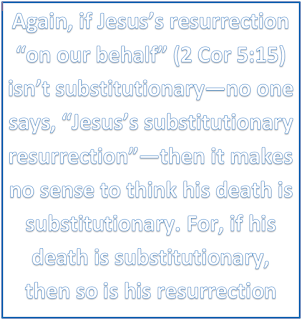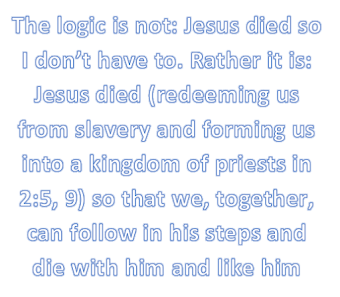Closing thoughts on the PSA series, Jon DePue and "penal" problems (8 of 7)
Time to wrap this all up before posting a link to Mike's response video. Andrew Rillera's posts (listed here) were meant to generate discussion about the claims made in Mike Bird's original post, here. I said in the first post, and will repeat here, "Mike’s post is short and not intended as an extended defence of PSA". That is worth bearing in mind. Nonetheless, truth claims were made about Paul's letters and Andrew's posts—anything but short!—are a sustained critique of Mike's exegesis of his own key texts.
More could be said, of course, but I will merely add two further issues.
1) Well, the first is not an issue as much as a single video, namely Jon DePue's trinitarian critique of penal substitution. Jon argues that PSA necessarily fractures the homoousion, leading to a functional tritheism and ultimately to an undermining of the centrality of Christ. These are things, to be clear, that we do not want. So watch his video and try to answer a crucial question: does PSA indeed necessarily lead to these ends? If not, why not? If it does, well, time to reject it and return to recapitulation or some other ancient account of the saving significance of Jesus, such as the Apostle Paul's *cheeky grin*! (FYI, I hesitate to speak of "models" given Khaled Anatolios's recent case in Deification through the Cross, which is def. worth checking out). The only other thing worth adding is that Jon has recently rethought the place of the homoousion in light of McCormack's wonderful new book on Christology (and Jon’s got some great videos on that, too!), meaning that he is now less concerned with preserving that concept per se than he used to be. Regardless, the logical problems are still there, as well as the resulting occlusion of Jesus's centrality.2) Andrew spent his time critiquing use of the word "substitution". An alternative exegetically based theological critique will take aim at the use of the word "penal".
"Penal" is deployed in atonement theology to bring particular forensic notions into play, namely those that associate justice with the exactment of a penalty, understood in terms of punishment and desert. It is related to the Latin punire to mean the infliction of a penalty, "to cause pain for some offense". Of course, words are flexible little buggers and need to be understood by how they are used, so I take two books from my shelf almost at random to allow defenders of PSA to express the import of "penal". So, as Bruce Demarest explains in The Cross and Salvation (in the Foundations of Evangelical Theology series): "Penal substitution indicates that the Messiah died in the sinner's place and took upon himself the sinner's just punishment" (p. 193, italics mine). Or as Douglas Moo recently opines in A Theology of Paul and His Letters, "Christ's death atones because he suffers and dies in the sinner's place. This 'place taking' is then often elaborated in terms of punishment" (393, italics mine). It is worth allowing Moomore space, here, to elaborate the logic involved, thereby helping us coordinate his account of what is "just" in this scheme: Those "in Christ can be certain of escaping God's wrath on that day because ... it has been fully absorbed by Christ on the cross". He continues: "In the face of human sin and the condemnation under which sinners stand, God has sent Christ to be a full and final sacrifice for sins as a means of 'justifying' believers—putting them in a legal state of righteousness—and remains 'just' while doing so because Christ is our substitute, bearing the full judgment we deserve" (398-99).
It follows, I think uncontroversially, that "penal" as an adjective here names an attribute of the noun "substitution" to mobilise a particular account of justice, namely a retributive one understood negatively (i.e., as punishment. This is not about positive retribution involving compensation, which is an entirely different matter). It is one in which justice is served by means of the exactment of a penalty understood in terms of deserved punishment.
Two lines of thought need to be brought to bear in response. First, why must this account of justice be assumed and prioritised? After all, Michael Sandel's Justice: A Reader proffers numerous accounts of justice and not one of them articulates it as negative retribution. So let's not pretend that it is the only option whenever words glossed with "just" or "condemnation" are used. Numerous other forensic notions can be and are deployed, which are specifically non-negative-retributive. (For the record, and here I am glaring at some NT scholars who should know better, questioning this particular negative-retributive account of justice a Marcionite does not make!)
Second, we can build on this insight to offer crucial interpretative aid. For Paul will insist that God's δικαιοσύνη (typical glosses being "righteousness" or "justice")—however we might conceive it—is revealed in the gospel (compare Rom 1:16-17; 3:21-22). Divine "justice" is thus the content of the good news not the problem that the gospel needs to solve. Justice for Paul is, in other words, to be parsed according to a gospel-driven grammar and cannot be projected into Paul's theology willy-nilly because of some pre-conceived and undifferentiated notion.
This means that, to understand this Rom 1:17 δικαιοσύνη, one needs a broader account of the event of God in Christ, for Paul. Only this would respect the point that God's act in Jesus Christ is the content of God's δικαιοσύνη. As such it is an act of unconditional love and benevolence precisely "while we were still sinners" (Rom 5:8)—not when we had met certain conditions but when we were at our worst, so to speak. This is to say that it does not operate according to the dictates of negative retribution and desert (compare language used by Demarest and Moo above). It is an event of loving solidarity, to the point of death—even death on a cross—for one died, therefore all died (2 Cor 5:14; Phil 2:6-11), and we shall also be raised with him (2 Cor 4:14). It is an act which in resurrection and by the Holy Spirit liberates us from the powers of Sin and Death (Rom 6; Gal 5). This is further evidenced in the way Paul predominantly talks about freedom from enslavement rather than forgiveness from guilt (do a search for the word “forgiveness” in Paul’s letters and compare your result with the number of times, e.g., Luther uses the word [“Vergebung/Verzeihen” if you're really keen] in his commentaries on Paul. It’s a revealing exercise). It is, thus, an event that delivers, pressing us toward forensic liberative notions of justice. At least this would all be a good start in unpacking a Pauline account of justice.
Defenders of PSA will need to mount a case that God's justice necessarily, in Paul, involves punishment and the causing of pain, and in a way that overtly overrides other central Pauline intuitions (if one wants to say PSA is the central or core of atonement). Good luck with that!
A little more promising is to claim, if one wants to adopt a kaleidoscope view of atonement models (which is the best a PSA defender can hope for in reading Paul), that such retributive notions can cogently stand alongside Paul's alternative scheme of justice in the gospel, without generating devastating intrinsic, systematic and empirical problems. But this has not been done, to my mind; the compatibility is usually asserted without awareness of the problems generated. In fact, wider analysis of political dimensions (Hauerwas on western justice, Jared Diamond on tribes), the nature and deployment of metaphors in these debates (relating to "payment" and "compensation" working in both positive and negative directions—Lakoff, soon Campbell), and John Wayne masculinity scripts (the warrior who inflicts equal or greater harm in response to harm and distress) are perhaps making the gap between these alternative accounts of justice (negative retributive vs. Paul's gospel-driven account) wider—not more plausible. Further, this strategy would also need to show its concrete relation to the Christ event in general in Paul's theology, and not merely pluck out bits where Paul sounds retributive. In other words, the onus is very much on defenders of the word "penal" to demonstrate the case against considerable exegetical, theological and theoretical pressure."But muh retributive justice is in these wider Bible passages" says someone while stabbing at pages of the NIV. OK, granted, but all manner of different notions of justice can be mobilized by various parts of Scripture, and most involve acts of judgement that do not end in punishment, but rather in the correction, education and redemption of God's people as a whole (a claim that would take me beyond the bounds of this post to defend, would present a positive account of retribution as compensation, and would relate to Revelation, the nature of OT prophecy, and more besides). This imaginary someone has a good instinct, of course. The scopus of Scripture needs to be respected, prayerfully received. But any truly Christian theological account must orientate its reading of the Bible as a whole to the Word of God, namely Jesus Christ (see, e.g., John 5:39-40), which is effectively what Paul insist in Rom 1:17. God's "justice" is revealed in the gospel. This must be our primary and most important orientation otherwise unevangelised notions of justice will determine our core theological axioms in inappropriate ways. And that won't end well. Taken to its worst (yet perhaps most logical) ends, penal substitutionary atonement risks inscribing unevenaglised notions of justice into the heart of the God-human relation.
This has real world consequences that need to be faced; this is not an exercise in abstractions. At one level it will lead to confused preachers, unsure how to speak of love and justice/holiness "in balance", not only upsetting those who endorse divine simplicity, but also those who do not want to undermine the radical beauty of the Christ-centred good news of Paul with some zero-sum word juggling (e.g., the "God loves you but he is also just" kind of nonsense one often hears in some churches). At another level, once penal notions of justice are inscribed into the gospel, into the heart of core theological truths, we necessarily have a God who can endorse the death penalty. In parts of the world, like Texas or Belarus, this matters a hell of a lot. Our Bible exegesis is a public act with concrete consequences for which we are responsible.
So I question the "penal" part of penal substitutionary atonement. Andrew questions the "substitution" part. What kind of atonement are we left with, then? Well, if you want a positive account of Paul's theology of the cross, you might find this popular level article I wrote a few years ago useful.
Labels: Rillera
























